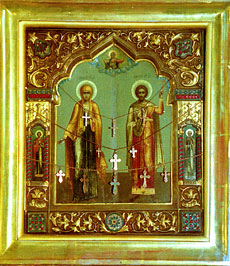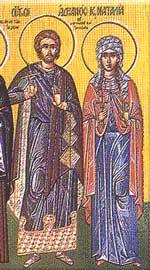|
|||
|---|---|---|---|
| This weekly bulletin insert complements the curriculum published by the Department of Christian Education of the Orthodox Church in America. This and many other Christian Education resources are available at http://dce.oca.org. | |||

The Church honors two fourth-century saints named Adrian and Natalia, a young married couple who lived in Nicomedia, which was part of the Roman Empire. Natalia was a Christian; her husband was not. Visiting Nicomedia, the fiercely anti-Christian Emperor Maximian promised a reward to anyone willing to reveal the names and whereabouts of Christians. Many people were willing to denounce their neighbors, and twenty-three believers hiding in a cave were informed on, captured, and tortured. Then they were brought before the Praetor, or magistrate, so that a scribe could record their names and statements. Natalia and Adrian had been married for only a little over a year. But Adrian, at the age of 28, already had an important position as governor of the Praetorium. So the tortured Christians were assembled before him, and he watched in astonishment as they not only kept their composure under questioning and threat, but refused to deny their faith. Finally Adrian felt compelled to challenge the Christians directly. He asked, "What do you hope for from this God of yours; what makes such suffering worthwhile?" The calm, sure answer came at once. The Christians declared that the rewards God is eager to bestow can hardly be imagined, let alone described. Adrian's response shows that he had absorbed the truth reflected in II Corinthians 6: 14: "Do not unite yourself with unbelievers; they are not fit mates for you. What has righteousness to do with wickedness? Can light consort with darkness?" He turned to the scribe and said, "Record my name with the rest. I too am a Christian." No doubt Natalia had hoped that her husband would embrace the faith, but she would not have chosen these circumstances. Both of them were young, they had just begun a life together, and they were in love. What she did next would surprise many people, because she did not try to preserve her husband's life. Instead she urged him to martyrdom. The Emperor, hearing of Adrian's action, said the young aristocrat must have lost his mind. But Natalia visited the prison and encouraged her husband, by now beaten and injured, to persevere to the end without losing heart, and never to doubt that the faith he had found was worth the price. Knowing that his determination might weaken if he saw others suffer, she even asked that her husband be first to be tortured to death. 
How many of us believe that there is nothing more important than preserving life, especially the life of young, healthy people with bright futures? Would we give our lives for the faith? Would we urge our spouses, or perhaps our children, to do so? Could we explain to someone why some saints chose martyrdom? We may never be called to do any of those things. But it's worth considering the next words from II Corinthians 6: "Can there be a compact between the temple of God and the idols of the heathen? And the temple of the living God is what we are." |
|||
